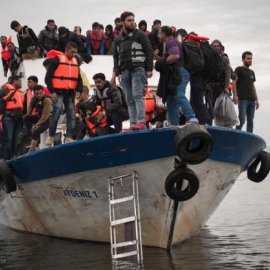Migrants at Sea
-
English
-
ListenPause
I’m Peter Neill, Director of the World Ocean Observatory. We have seen the photographs and television images of a bedraggled lot of refugees, far too many for their flimsy craft, seeking rescue at sea or asylum alongshore. The images reveal a very real compulsion to seek freedom or opportunity in a place across the water; the dangers are evident, the desperation is palpable. Over the past decades, the situation has only gotten worse. The reports of stowaways aboard ships or in containers, and of the dead and missing at sea are increasing in many parts of the world, a refugee migration that has gone mostly undocumented until now. These voyages are always ill-prepared, complicated by lack of cover from the sun, fresh water, and food, by adverse weather and sea conditions, by the fundamental unseaworthiness of the vessels, by extreme over-crowding, and, by the involvement of unscrupulous intermediaries who prey upon the desperation, arrange the voyages, take the money, and abandon their clients almost certainly along the way. Some nations have responded to the problem by enhancing monitoring and surveillance. FRONTEX, the European border management agency, launched the European Patrol Network to bolster security of the European Union’s southern coastal waters. The Network is also cooperating with several West African nations in an attempt to stem a new migration flow by boat from Africa to the Canary Islands. And, in the United States, the US Coast Guard has been incorporated into the Department of Homeland Security wherein refugee surveillance is included in its mandate to curtail illegal activities such as drug smuggling or terrorist activity in our coastal zone. International law, indeed maritime tradition for all time, has firmly established the obligation to rescue persons at sea. But complex political conditions or the decision by certain countries not to disembark boat people on their shores has created disincentives for captains to assist vessels in distress or deliver refugees to safe harbor. Several reports from the Mediterranean where refugee craft were not offered rescue by shipmasters for these reasons. It seems unthinkable that such circumstances would compromise or prohibit a humanitarian response that lies at the core of values long demonstrated at extreme personal risk by mariners. Moreover, in some instances, unreasonable fines have been imposed on ship-owners when passengers are found by public authorities to have inadequate documentation or are otherwise deemed inadmissible by the state. Most refugees, of course, have no passports or identification, and absurd administrative stalemates have occurred, with ships arrested in port with captain, crew, cargo, and refugees held for days in political limbo. As these migrations increase, it becomes more and more likely that, even if these refugees survive the dangers of their voyage, they will be immediately deported and sent home to face the consequence. The International Maritime Organization and the Office of the United Nations High Commissioner for Refugees are convening meetings among the various agencies and nations for which this is an existing problem. With all the best intentions, they will work to regularize international response to maritime migration, but as long as there is conflict at home, as long as there is an alternative opportunity to be reached across the sea, if there is a boat to be had, men and women will launch it at whatever risk in search of a different shore. We will explore these issues, and more, on future editions of World Ocean Radio.
Record numbers of migrants are taking to the seas to escape political strife, sectarian conflict and war, crossing the Aegean and Mediterranean seas aboard inadequate vessels in search of better and safer lives for themselves and their families. Many are struggling to cope with the sheer numbers: from the coastal nations receiving desperate refugees, to the border management agencies, to the UN and the IMO, to the mariners at sea obligated by maritime tradition to rescue those in crisis on the water. In this episode of World Ocean Radio, host Peter Neill will discuss the complicated geopolitical, maritime and humanitarian crisis we now face.
About World Ocean Radio
Peter Neill, Director of the World Ocean Observatory and host of World Ocean Radio, provides coverage of a broad spectrum of ocean issues from science and education to advocacy and exemplary projects. World Ocean Radio, a project of the World Ocean Observatory, is a weekly series of five-minute audio essays available for syndicated use at no cost by college and community radio stations worldwide. A selection of episodes is now available in Portuguese, Spanish, French, Swahili, and Mandarin, enabling us to reach 75% of the world's population. For more information, visit WorldOceanObservatory.org/world-ocean-radio-global.
Image
Migrants and refugees aboard a Turkish fishing vessel as they arrive on the Greek island of Lesbos after crossing part of the Aegean Sea. October 2015.
Credit:
![]()
Reuters | Fotis Plegas G
- Login to post comments



